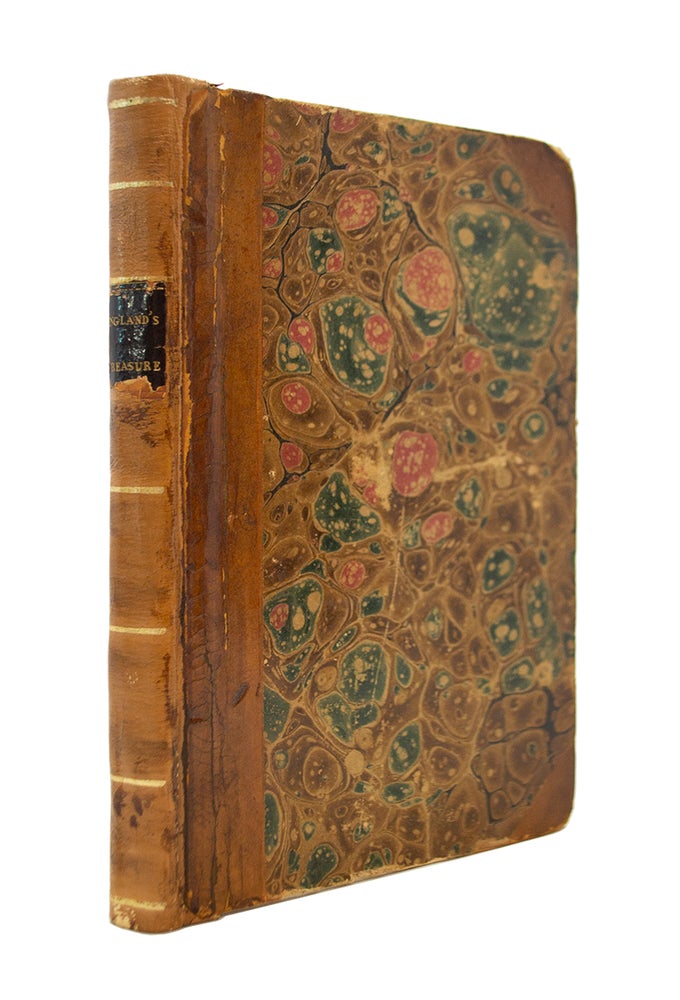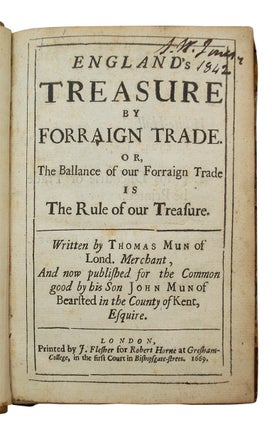"The Bible of Mercantilist Thought"
England’s Treasure by Forraign Trade. Or, The ballance of our forraign trade is the rule of our treasure.
London: Printed by J. Flesher for Robert Horne, 1669.
Full Description:
MUN, Thomas. England's Treasure by Forraign Trade. Or, The ballance of our forraign trade is the rule of our treasure. London: Printed by J. Flesher for Robert Horne, 1669.
Second edition. Small octavo (6 1/4 x 4 3/16 inches; 160 x 107 mm). [6], 186, 149-155, [1, blank] pp. Although the pagination jumps, book is complete and collates the same as the British Library copy. With Imprimatur on leaf A1V. Only one copy of the first has been at auction since 1977.
Early half calf over marbled boards. Rebacked to style using original black morocco spine label, lettered in gilt. All edges speckled red. Board edges rubbed. Corners bumped. Spine label chipped. Previous owner's old ink signature on title-page. Top edge trimmed close throughout, occasionally touching headline. Some foxing and toning. Still a very good copy.
Thomas Mun was a merchant and economic writer. "Mun's prominence as a guardian of the East India trade ensured him respect within governing circles, but his enduring fame stems from a work that appeared only twenty-three years after his death: England's treasure by forraign trade, or, The balance of our forraign trade is the rule of our treasure. Its exact date of compilation is uncertain, although most experts concur that its genesis lies with the great economic controversies of the 1620s and his campaign to justify the privileges of the East India Company. In common with other writers of the age, he encompassed a range of economic concerns in this work, most notably the decline of the fisheries, but the passages dealing with the balance of trade remained its chief attraction for seventeenth and eighteenth-century audiences. Many of its arguments were anticipated by his earlier writings, especially its anti-Dutch bias and its critique of Malynes, but its lasting influence was secured by Mun's brilliance in asserting the significance of the balance of trade in a systematic and coherent manner, which made it accessible to a very wide audience. Even though Mun warned against attempts to influence the flow of trade between countries, the tract has been widely seen as the bible of 'mercantilist thought', its arguments encouraging successive generations of politicians to introduce protectionist measures to ensure that the nation maintained a favourable balance of trade with other countries. In his professional capacity Mun had worked hard to educate ministers concerning the importance of foreign trade, but he was only too aware of the detrimental effects of international rivalry on overseas commerce. [After his death] It was left to his son John to publish his most famous work in 1664, who, without undue exaggeration, described his father as 'in his time famous among merchants, and well known to most men of business, for his general experience in affairs, and notable insight into trade' (England's Treasure, dedication). The subsequent success of England's Treasure paid testament to his abilities, with further editions in 1669, 1698, 1700, 1713, and 1755." (Oxford DNB).
Einaudi. Goldsmiths'. Kress. PMM 146.
HBS 68791.
$7,500.
Price: $7,500.00
Item #68791


